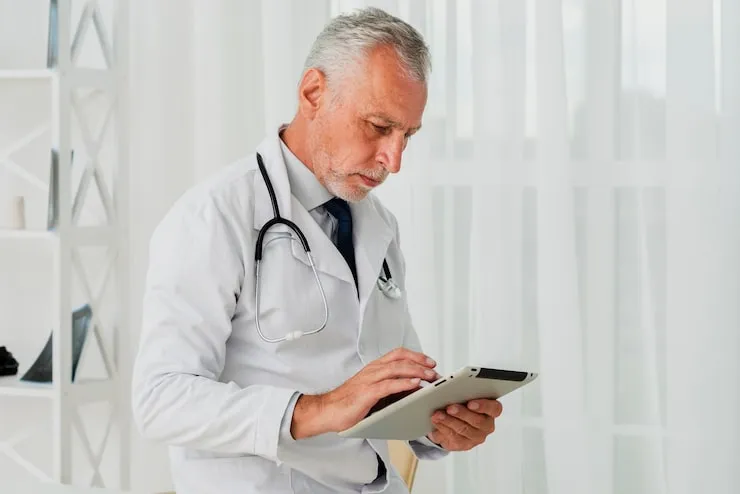Health services in Andhra Pradesh are undergoing rapid transformation. While earlier health workers in rural areas had to rely on long register files to enter data, now the same work is being done through tablets. The change is part of the state government's "Digital Health Mission" scheme.
The main objective of this scheme is to make the health system modern, fast and transparent. With the tablet, every patient's record is now saved in digital form. This not only saves time but also gives accurate and up-to-date information to the health department instantly.
The objective of the Digital Health Mission
The state government took this step so that health services could be improved in both rural and urban areas. Earlier, health workers had to go to every house and fill up forms, which was a long and tedious process. Now this process has become easier and faster through tablets. The main objectives of this initiative are:

Creating a digital health record of every citizen. Making health services transparent and accessible. To convey the information of the patients to the hospitals and health centres immediately. Improving the quality of health services through technology in rural areas.
How tablet-based data systems work?
The health workers enter the information through a special app on their tablet. The app has been developed by the state health department. When health workers visit a patient's house, they simultaneously enter the patient's name, age, disease, treatment and medicines in the tablet.
Read Also: Top 5 Laptops For Engineering Students In Tamil Nadu
This data is immediately uploaded to the online server. This allows the department to know which diseases are more prevalent in which areas and where special attention is needed. In this way, data collection has now become a means of decision-making, not just a means of keeping records.
Advantages: Simple, fast and reliable system
The use of tablets has seen many great benefits in health services.
Saving time: Earlier it used to take hours to fill the manual register. Now the data can be entered and sent within a few minutes.
Accurate information: The probability of error in digital systems is very low. This makes the reports more accurate.
Increased Transparency: Now every piece of data reaches the department in real-time. This has reduced the possibility of any kind of confusion or misreporting.
Easy to analyze the data: With the computer-based system, the health department can now easily understand the statistics of various diseases and areas. This facilitates policy making.
Contribution of Technology in Rural Health Services
Health workers in rural areas often lacked resources. Now the tablet has made up for this shortcoming to a great extent.
From the tablet, health workers can see the complete history of each patient. If a patient has had any disease before, then his record is also available. This makes it easier to get the right treatment. In addition, health workers in villages are now able to digitally inform people about vaccination, care of pregnant women and health of children.
The role of women: Empowerment through digital training
Many women health workers (ASHA workers and ANMs) in Andhra Pradesh have also become a part of this digital transformation. Earlier, many of these women were afraid of using technology, but the government trained them to use tablets.
Now these women are not only registering the data but also making the people of the village health conscious. This has given women both self-reliance and confidence.
Challenges: Some improvements are still needed
Although the program has been successful, some challenges remain. Internet connectivity is weak in many rural areas. In some places, the power problem hinders the charging of the tablet. Not all health workers are fully proficient in digital technology. The government is working to address these issues. New mobile network towers are being installed and tablets with battery backup are being made available.
Government support and cooperation
The state government has also taken support from the Centre's "Ayushman Bharat Digital Mission" to take the scheme forward. Under this scheme, every Indian will be given a unique health ID. With this ID, the complete medical record of any patient can be seen in any part of the country.
Apart from this, the government is also giving regular training to the health workers so that they can understand the new technology better and use it properly.
What has changed for patients?
Earlier, patients had to keep their reports and medicine slips handy. Now all their information is present in the digital system.
If a patient has to be treated in another hospital, the doctor can see his entire record through the tablet only. This reduces the time taken for treatment and helps in giving the right medicines.
The future direction: Digital health for every citizen
The Government of Andhra Pradesh aims to digitize the health data of every citizen in the coming years. For this, digital health clinics and mobile health vans are being started in all the districts.
You Must Also Like: Andhra Pradesh Students Opt for DSLR Courses and Training
These mobile vans will be equipped with tablets and internet, which will be able to update data even in remote areas. In the future, doctors and health officials will be able to predict diseases in advance with artificial intelligence (AI) based analysis. This will make it easier to prevent the disease in the state.
Conclusion: Life is better with technology
The use of tablets by health workers in Andhra Pradesh is proving to be a big change. This has not only made data management easier, but also made health services faster and accurate.
From villages to cities, the health system is now moving digitally everywhere. This initiative is not just a technological advancement, but it is a big step towards the convenience and safety of the general public. In the coming times, this model can become an inspiration for the entire country.
Main points:
Data collection from the tablet was easy and accurate. Increased transparency and efficiency in health services. Women health workers empowered with digital technology. The government is implementing the Digital Health Mission across the state.













